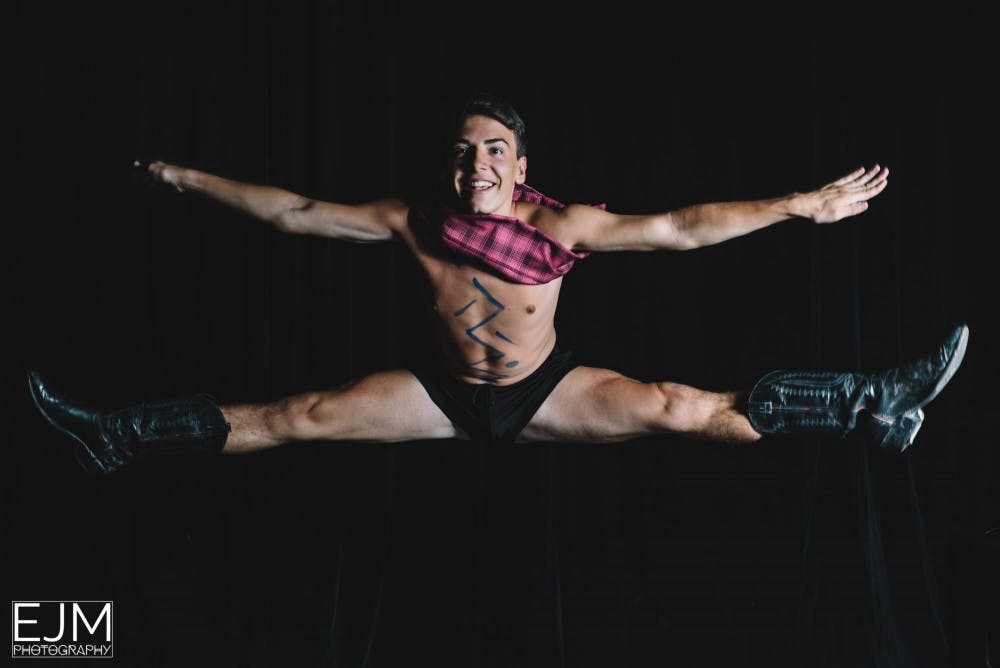Bradley Barefoot, a UNC senior, has been involved in student theatre since his first semester at UNC. Now, he is choreographing Company Carolina’s upcoming performance of "Sweet Charity."
Barefoot said he feels so drawn to dance because it offers a unique form of expression. For Barefoot, dance represents an entirely different language, enabling him to communicate ideas that he can’t say with words. Barefoot also said dance is his sport. Dance not only gives him a form of expression, it keeps him physically healthy.
Barefoot said growing up, he's experienced first hand the assumption that dance is an activity only for females.
“When I was younger, being in a female-dominant space, there’s always that assumption that you’re not fully male if you do something that traditionally women do, and vice versa,” Barefoot said.
Barefoot said he believes the people who assume that boys shouldn’t dance are those who haven’t been exposed to the arts and don’t understand all that dance can do.
“I’ve always found that people who said that to me generally didn’t really know what they were talking about,” Barefoot said. “They didn’t know what dance can encompass; they didn’t know what dance can do for you emotionally and physically.”
Despite this gendered barrier, Barefoot said the other male dancers in his life encouraged him to continue his passion.
“I grew up — when I was in my dance realm — seeing male dancers really being celebrated,” Barefoot said. “That always encouraged me to keep going, and lit this fire under me that maybe was being extinguished by other people in my life who didn’t really know what the arts do.”
Barefoot said dance at UNC specifically has expanded traditional forms of dance, creating entirely new genres.
“We’ll take classic elements of dance or classic techniques of dance and turn them on their heads to give a new life to dance and create a new genre,” Barefoot said. “That’s what I try to do with my choreography.”
Tristan Parks
For Tristan Parks, class of 2019 for the Professional Actor Training Program, dance is far more than just movement — dance is revolutionary.
To get the day's news and headlines in your inbox each morning, sign up for our email newsletters.
Parks' work centers on studying movement that came to the United States during the post-transatlantic slave trade and movement that arose out of the Diaspora. Parks said he combines this study with his background in classical training.
“Right now, I’m interested in looking at West African techniques met with Western European techniques,” Parks said. “I’m looking at codifying and de-codifying the languages of both worlds and the movements that have been born out of both worlds.”
To Parks, his practice of dance involves not only performance, but bearing witness. His study of diasporic work means he examines how dance is passed down trans-generationally. His performance is not only to be seen, but to be understood, and specifically understood in its historical context.
Parks said he also aims for dance to be a collective undertaking driven by shared understanding of the spirit.
“I want us to reach a place where dance is not foreign for us, it’s not fear-driven, but it’s driven by spirit,” Parks said.
“We’ll see how long that lasts”
Spencer’s comments, hinting at the improbability of Prince George enjoying ballet past childhood, were met with instant criticism from the dance community. Barefoot said Spencer’s comment further perpetuates the harmful stereotype surrounding male dancers.
“By making a comment like that, you’re only further perpetuating that stereotype,” Barefoot said. “Things aren’t going to get better for people who face adversity in those kinds of situations; they’re only going to get worse. For things that aren’t productive to gender equality, maybe just say nothing instead.”
Weeks said that Spencer’s comment indicates the gendered foundation of our society.
“We have built our society and our social structure in such a gendered way to where it is so hard for us to break those boundaries and those layers,” Weeks said.
Park also described Spencer’s comment as evidence of the inherent patriarchy rooted in our society.
“This is rooted in history of assigned gendered behavior,” Parks said. “We often associate dance with the feminine, and what we often associate with the feminine, we also associate with the female, which is very patriarchal.”
Spencer issued an apology on Aug. 26 for her comments and sat down with three dancers to hear their perspective and share their story.
Weeks said he was glad she not only apologized with words but also with action by giving male dancers a platform to share their perspective. However, Weeks said her comment was still harmful to those who heard it.
“There is irreversible damage that that causes when you say something like that on TV,” Weeks said. “Not necessarily everyone who saw that is going to see the apology.”
Parks said this discussion of gender representation in dance lends itself to another needed discussion — the lack of representation of artists of color.
“Why weren’t there three male-identifying ballet dancers on the talk show who represented different backgrounds, who represented different ethnicities, who represented a different color?” Parks asked of Spencer's interview.
Parks said he wants to challenge the dominant image of the male ballet dancer as white and cisgender. In ballet, Parks said a specific body type has continually been perpetuated.
“It is important that the world sees that there all sorts of male-identifying ballet dancers,” Parks said. “It is vital that the world recognizes this.”
Parks said he is glad that this conversation is happening, but he hopes this dialogue continues and expands to address barriers within dance as a whole.
“I really want to continue to have this conversation about dance and these assigned gender roles,” Parks said. “I really want to continue to unpack these ideas and these counterproductive behaviors.”
@MadelinEllis
arts@dailytarheel.com



